

IDEAS/RePEc Simple Impact Factors (Last 10 Years) for Journals. Kurdistan : Oui, le peuple peut changer les choses (l’expérience du Rojava) Un reportage de Zaher Baher, du Kurdish Anarchists Forum et du Haringey Solidarity Group (Londres), juillet 2014, traduit par Alain KMS, avec Alternative libertaire.
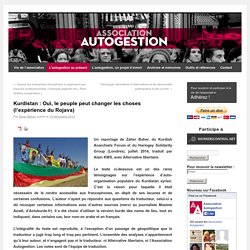
Le texte ci-dessous est un des rares témoignages sur l’expérience d’auto-organisation populaire du Kurdistan syrien. C’est la raison pour laquelle il était nécessaire de le rendre accessible aux francophones, en dépit de ses lacunes et de certaines confusions. L’auteur n’ayant pu répondre aux questions du traducteur, celui-ci a dû recouper certaines informations avec d’autres sources (merci au journaliste Maxime Azadi, d’Actukurde.fr). Il a été choisi d’utiliser la version kurde des noms de lieu, tout en indiquant, dans certains cas, leur nom en arabe et en français. L’intégralité du texte est reproduite, à l’exception d’un passage de géopolitique que le traducteur a jugé trop long et trop peu pertinent. La Cizîrê est l’un des trois cantons du Rojava. Les trois cantons kurdes en mars 2014.
Le contexte Le Printemps arabe 1. 2. Journal of Public Deliberation. Journal of Public Deliberation is a peer reviewed, open access journal with the principal objective of synthesizing the research, opinion, projects, experiments and experiences of academics and practitioners in the multi-disciplinary field of "deliberative democracy.
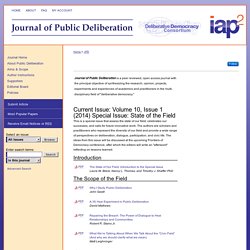
" This is a special issue that assess the state of our field, celebrates our successes, and calls for future innovative work. The authors are scholars and practitioners who represent the diversity of our field and provide a wide range of perspectives on deliberation, dialogue, participation, and civic life. The ideas from this issue will be discussed at the upcoming Frontiers of Democracy conference, after which the editors will write an "afterword" reflecting on lessons learned. Introduction The Scope of the Field Challenges Promising Future Directions Book Reviews. Public Knowledge Project. Open Journal Systems Open Journal Systems (OJS) is an open source software application for managing and publishing scholarly journals.
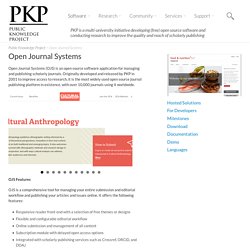
Originally developed and released by PKP in 2001 to improve access to research, it is the most widely used open source journal publishing platform in existence, with over 10,000 journals using it worldwide. OJS Features OJS is a comprehensive tool for managing your entire submission and editorial workflow and publishing your articles and issues online. It offers the following features: OJS is free and open source software released under the open source GPL v2 license.
PKP Publishing Services also offers a fee-based service which provides the installation and hosting of OJS, as well as performing daily backups of your data, applying security patches and upgrades, and priority answering your support questions. Pivot. Would you like to publish your research at its natural length?
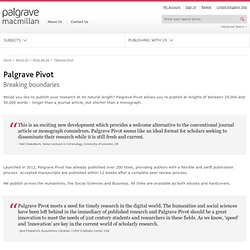
Palgrave Pivot allows you to publish at lengths of between 25,000 and 50,000 words - longer than a journal article, but shorter than a monograph. This is an exciting new development which provides a welcome alternative to the conventional journal article or monograph conundrum. Palgrave Pivot seems like an ideal format for scholars seeking to disseminate their research while it is still fresh and current. - Neil Chakraborti, Senior Lecturer in Criminology, University of Leicester, UK Launched in 2012, Palgrave Pivot has already published over 200 titles, providing authors with a flexible and swift publication process.
Accepted manuscripts are published within 12 weeks after a complete peer review process. We publish across the Humanities, the Social Sciences and Business. Palgrave Pivot meets a need for timely research in the digital world. Why publish with Palgrave Pivot? Want to talk? Find out more. Territoire en mouvement Revue de géographie et aménagement - Territory in movement Journal of geography and planning. Territoire en Mouvement est une revue de géographie et aménagement-urbanisme éditée depuis 2006 par l’Université de Lille.
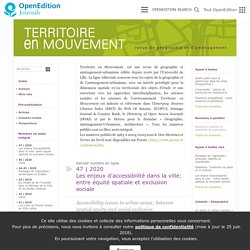
La ligne éditoriale concerne tous les sujets de la géographie et de l’aménagement-urbanisme, avec un intérêt privilégié pour la dimension spatiale et/ou territoriale des objets d’étude et une ouverture vers les approches interdisciplinaires, les sciences sociales et les sciences de l’environnement. For Authors. Solutions Author Guidelines What qualifies as a solution?
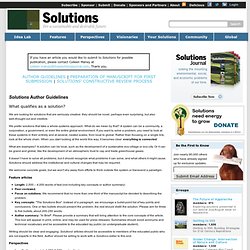
We are looking for solutions that are seriously creative: they should be novel, perhaps even surprising, but also well-thought out and credible. We prefer solutions that take a whole-systems approach. What do we mean by that? A system can be a community, a corporation, a government, or even the entire global environment. What are examples? It doesn’t have to solve all problems, but it should recognize what problems it can solve, and what others it might cause. We welcome concrete goals, but we won't shy away from efforts to think outside the system or transcend a paradigm. Feature articles Length: 2,500 – 4,000 words of text (not including key concepts or author summary) Peer-reviewed.Focus on solutions. Writing should be clear and engaging. Perspectives Length: Approximately 1,250-2,500 words of text.Description: Opinion piece or more personal essay.
On the Ground Writing should be clear and engaging.